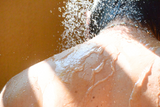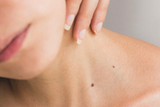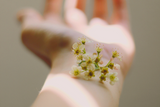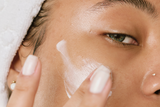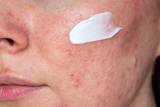Easy Peasy You
How to properly exfoliate sensitive skin
Posted by Lara Schimweg on
How good are scrubs for sensitive skin?
Avoid strong acid peels with AHAs and BHAs.
Avoid mechanical exfoliation
Enzyme peels or PHA peels are better suited for sensitive skin.
Acid peels for sensitive skin
If you have sensitive skin and want to try an acid peel , always start with very low concentrations and don't use the peels daily at first. Your skin needs the chance to get used to this new stimulus.
If your skin is prone to severe breakouts or numerous pimples, you can actively treat them with salicylic acid. Salicylic acid (also called BHA or beta-hydroxy acid ) has anti-inflammatory properties and removes dead skin cells. It loosens the oil from the pores, allowing sebum to flow more easily. Like many acid peels, it makes the skin more even-toned.
Always be aware that BHA is an active ingredient that actively affects your skin's metabolism. Especially for sensitive skin, an AHA peel can be too much. Carefully consider beforehand whether your skin truly needs this active ingredient. For a few small blemishes, you don't need to trigger such a strong reaction. If you still want to try it and have no prior experience with salicylic acid, thoroughly research the correct application and recommended concentrations.
Your skin might become a little red or tingly. This isn't usually a problem. However, sensitive skin can also overreact with excessive redness, sores, and inflammation. Always pay attention to your skin and listen to its needs. If BHA causes severe pain, inflammation, or excessive redness, stop using it immediately. No skincare product should cause such reactions. This is a clear sign of an intolerance.
Because BHA helps sebum flow more easily, it can sometimes lead to an initial worsening of the skin's appearance. Pimples may appear in areas prone to breakouts, allowing the sebum to escape. This so-called purging phase can last approximately 4-8 weeks. If you develop pimples and pustules in areas where you've never had blemishes before, it's probably not purging. In this case, it could be an intolerance. It's best to discontinue using BHA.
Caution: It is absolutely essential to apply sufficient sunscreen daily when using salicylic acid. Because the skin will peel, it will be much more sensitive to the sun. You should also moisturize your skin well, as BHA dries it out.
Get our free sun protection guide for sensitive skin here.
Here you will find tips and sunscreens from various brands that may be suitable for sensitive skin.
By registering, you confirm our Privacy Policy .
You will receive a confirmation email shortly. Confirm in the email that we may send you messages and download the sun protection guide.
There are also AHAs (Alpha Hydroxy Acids). However, these are usually not well tolerated by sensitive skin.
If you absolutely want to use an AHA as a peeling agent, lactic acid and especially mandelic acid are considered the most tolerable.
Over-peeling with acid peels can easily lead to perioral dermatitis , also known as irritated skin. In such cases, a so-called "zero treatment" is often the only effective solution .
Natural cosmetics also offer peels. These typically use fruit acids (AHAs), such as pineapple, papaya, or hibiscus extract. They are intended to make the skin smoother and more even-toned. Similar claims are made as with acid peels from conventional cosmetics.
These natural fruit extracts are also very potent. Unfortunately, they have the disadvantage that you don't know exactly what concentration of natural active ingredients is in your product. Furthermore, the natural acidity of fruit extracts can vary considerably. This means the acidity can be subject to natural fluctuations. What's more, with natural fruit extracts, you're dealing with a multitude of different active ingredients in a single extract. For example, a pineapple isn't a single substance, but rather a whole range of different active ingredients that affect your skin. These substances aren't individually listed in the ingredient list (INCI) . And that can be problematic for your skin.
Just because an ingredient is naturally occurring doesn't necessarily mean it's milder. You wouldn't rub a lemon on your skin, would you? That would probably be too much acid for your skin.
Are there any mild peels at all?
A gentle peeling alternative is PHA (Poly Hydroxy Acid) . This peel moisturizes and, unlike other acid peels, doesn't make your skin more sensitive to sunlight. In the INCI list, you'll find PHA under the name Gluconolactone . Unfortunately, some products contain fragrances and other potent active ingredients in addition to PHA.
Even a mild enzyme peel is usually very well tolerated by sensitive skin. Enzyme peels often contain added fruit extract. A pure enzyme peel is much gentler on your skin.
One to two PHA or enzyme peels per week are perfectly sufficient. The decision is ultimately up to you and your skin. Your skin is simply the best judge of what it needs. Mild isn't always mild.
- Tags: empfindliche Haut, Hautpflege, Peeling
← Older Post Newer Post →
0 comments








